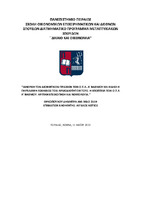Διάκριση των διοικητικών πράξεων των ΟΤΑ Α' βαθμού και ειδικά η παράλειψη ασκήσεως των αρμοδιοτήτων τους. Η εποπτεία των ΟΤΑ Α' βαθμού. Κριτική επισκόπηση και νομολογία

Προβολή/
Λέξεις κλειδιά
Εποπτεία ΟΤΑ Α' βαθμού ; Αρμοδιότητες ΟΤΑ Α' βαθμού ; Διοικητικές πράξεις ΟΤΑ Α' βαθμούΠερίληψη
Σύμφωνα με το άρθρο 101 του Συντάγματος, η Διοίκηση του Κράτους οργανώνεται κατά το αποκεντρωτικό σύστημα, κατά το οποίο η άσκηση της δημόσιας διοίκησης δεν γίνεται μόνο από τα κεντρικά κρατικά όργανα αλλά και από τα περιφερειακά. Ο αποκεντρωμένος χαρακτήρας του συστήματος διοικητικής οργάνωσης οριοθετείται προς αυτήν την κατεύθυνση και από το άρθρο 102 του Συντάγματος, με το οποίο θεμελιώνεται ο θεσμός της τοπικής αυτοδιοίκησης, στα πλαίσια της οποίας, τις αποφασιστικές αρμοδιότητες για μια περιοχή ασκούν οι οργανισμοί τοπικής αυτοδιοίκησης (Ο.Τ.Α.) πρώτου ή δεύτερου βαθμού και όχι το κεντρικό Κράτος.
Τον πρώτο βαθμό της Τοπικής Αυτοδιοίκησης απαρτίζουν οι Δήμοι, οι οποίοι είναι νομικά πρόσωπα δημοσίου δικαίου (Ν.Π.Δ.Δ.) και των οποίων η λειτουργία διέπεται, πρωτίστως, από τον νόμο 3852/2010 και συμπληρωματικά από τον Κώδικα Δήμων και Κοινοτήτων (ΚΔΚ, Ν 3463/2006) καθώς και από άλλα νομοθετήματα. Οι δημοτικές αρχές, λοιπόν, έχουν επιλεγεί από το εθνικό δικαιικό μας σύστημα ώστε να διευθύνουν και να ρυθμίζουν όλες τις τοπικές υποθέσεις σύμφωνα με τις αρχές της επικουρικότητας και της εγγύτητας, στις οποίες θα γίνει αναφορά στην παρούσα εργασία. Ο ν. 3852/2010 (άρθρο 94) και ο ΚΔΚ (άρθρο 75) απαριθμούν, με ενδεικτικό τρόπο, κατηγορίες θεμάτων που συνιστούν τοπικές υποθέσεις, ανήκουσες στις αρμοδιότητες των δήμων.
Οι αρμοδιότητες των Ο.Τ.Α. αφορούν, όπως αναλυτικά θα εκτεθεί και στην παρούσα εργασία, ‘’κυρίως’’ τους ακόλουθους τομείς με ενδεικτική απαρίθμηση: α. Ανάπτυξης β. Περιβάλλοντος, γ. Ποιότητας Ζωής και Εύρυθμης Λειτουργίας των Πόλεων και των Οικισμών, δ. Απασχόλησης, ε. Κοινωνικής Προστασίας και Αλληλεγγύης, στ. Παιδείας, Πολιτισμού και Αθλητισμού, και ζ. Πολιτικής Προστασίας.
Στα πλαίσια αυτών των αρμοδιοτήτων τους και μόνον, κατά την αρχή της νομιμότητας, τα διοικητικά όργανα των Δήμων μπορούν είτε να θεσπίζουν μονομερώς με πράξεις τους κανόνες δικαίου (δια της έκδοσης κανονιστικών πράξεων) είτε να ρυθμίζουν κυριαρχικώς τις έννομες σχέσεις των διοικουμένων με ατομικές ρυθμίσεις (δια της έκδοσης ατομικών πράξεων) είτε να συνάπτουν συμβάσεις, είτε τέλος να προβαίνουν σε υλικές ενέργειες. Ειδική δε μορφή διοικητικής πράξης συνιστά η σιωπηρή διοικητική πράξη, η οποία όταν εκδηλώνεται διά της έλλειψης ή της απουσίας οφειλόμενης δράσης συνιστά παράλειψη εκ μέρους της Διοίκησης και υπόκειται σε έλεγχο.
Ο έλεγχος ο οποίος μπορεί να διεξαχθεί επί των ανωτέρω διοικητικών πράξεων των Δήμων διακρίνεται στον δικαστικό και στον διοικητικό έλεγχο. Ένας δε από τους διοικητικούς τρόπους ελέγχου που έχουν προβλεφθεί στην ελληνική έννομη τάξη για τον έλεγχο των διοικητικών πράξεων των Ο.Τ.Α. αφορά τον διοικητικό έλεγχο ο οποίος ασκείται από τον Επόπτη Ο.Τ.Α. και έως την θέση σε εφαρμογή του θεσμού αυτού, από τον Συντονιστή Αποκεντρωμένης Διοίκησης και προηγείται της όποιας δικαστηριακής ενέργειας.
Στην παρούσα εργασία θα μελετηθεί το εύρος των τρεχουσών αρμοδιοτήτων των Δήμων και θα κωδικοποιηθούν τα είδη των διοικητικών πράξεων που εκδίδονται από αυτούς εντός του πλαισίου των αρμοδιοτήτων τους καθώς και τα χαρακτηριστικά τους σύμφωνα με την νομολογία, ενώ θα μελετηθεί και αξιολογηθεί η διαδικασία του διοικητικού ελέγχου ή αλλιώς αυτοελέγχου της διοίκησης που ενεργοποιείται είτε μέσω της άσκησης διοικητικών προσφυγών από τον διοικούμενο, όταν ο τελευταίος θεωρεί πως θίγεται ή βλάπτεται από την διοικητική δραστηριότητα, είτε διά του μηχανισμού αυτεπάγγελτου αυτοελέγχου της Διοίκησης, όπως για παράδειγμα μέσω του ελέγχου που ασκεί ένα ιεραρχικώς προϊστάμενο όργανο στο υφιστάμενό του, με δική του πρωτοβουλία.


